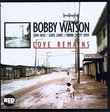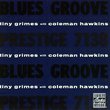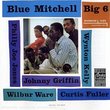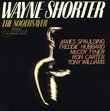| All Artists: Booker Ervin Title: Freedom Book Members Wishing: 0 Total Copies: 0 Label: Phantom Sound & Vision Original Release Date: 1/1/2008 Re-Release Date: 2/26/2008 Album Type: Extra tracks, Import Genre: Jazz Styles: Modern Postbebop, Bebop Number of Discs: 1 SwapaCD Credits: 1 |
Search - Booker Ervin :: Freedom Book
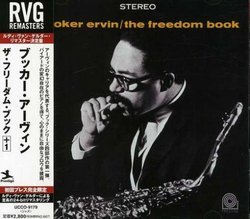 | Booker Ervin Freedom Book Genre: Jazz
Japanese only SHM-CD (Super High Material CD - playable on all CD players) pressing. Universal. 2008. |
Larger Image |
CD DetailsSynopsis
Album Description Japanese only SHM-CD (Super High Material CD - playable on all CD players) pressing. Universal. 2008. Similar CDs
|
CD ReviewsImpeccable tenor saxophone N. Dorward | Toronto, ON Canada | 01/27/2001 (5 out of 5 stars) "This disc comes from a large pile of discs Booker Ervin made in the 1960s for Prestige with a close-knit band including Jaki Byard on piano, Richard Davis on bass & the great Alan Dawson on drums. All are solid, but this is one of the best. The title is a bit of a misnomer; though it's informed by the freedoms of musicians like Dolphy & Coleman, the playing here is still basically in a forward-looking hard-bop mold (one might compare it in this regard with Jackie McLean's _Let Freedom Ring!_). Ervin's plangent tenor soars over the challenging comping of Byard; his sound remains one of the most arresting & potent in jazz, & listeners who (like me) first encountered it on the memorable introduction to Mingus's "Open Letter to Duke" (_Mingus Ah Um_) will enjoy the opportunity to hear Ervin at length. Dawson gives an impressive display of his originality (his unusual methods of timekeeping rubbed off a lot on his student Tony Williams--or is that vice versa, as Williams once claimed in an interview?), & he gets a well-deserved tribute & feature in the last track, "Al's In". The album is split between three burners--"A Lunar Tune", "Grant's Stand" & "Al's In"--and two sorrowful ballads, Randy Weston's "Cry Me Not" & the tribute to the late President Kennedy, "A Day to Mourn". Throughout there's a combination of passion and intelligence that marks this as first-rate jazz. This stands as one of the classic dates of the 1960s, less celebrated than the adventurous free/bop discs on Blue Note from this period (Hutcherson, Rivers, McLean, Hill, &c) but deserving mention in the same breath." Booker Ervin's masterpiece Donnie | Boston | 03/13/2003 (5 out of 5 stars) "If you're like me you were introduced to Booker Ervin via Charles Mingus. I first took notice of him when I heard "Wednesday Night Prayer Meeting" from the "Blues and Roots" LP. The gospel-inspired solo he unleashed is hands down my favorite sax solo and without a doubt one of the best solos ever committed to record. I cannot stress how big of a mistake it would be to only experience Booker's tenor on the Mingus records. His solo recordings, particulary the "Book" series, should be considered essential jazz listening, with "The Freedom Book" being the best of the best. The first 4 cuts alternate between hard bob and ballads, leading up to track 5, "Al's In", which is a hybrid of both styles. Starting at a slow tempo, it builds up steam culminating in solos by both Dawson and Davis until it slowly and mysteriously winds down. And of course Booker's remarkable tenor is present throughout. A thoroughly enjoyable listen.If this cd were on Blue Note, it would have been re-released as part of the RVG series, giving it the treatment and exposure it so rightly deserves. I would consider any jazz collection incomplete without at least one Booker Ervin cd in it. "The Freedom Book", quite possibly his definitive statement, would be my choice to complete that collection." No Saxophonist Played With More Passion! Andrew Stevenson | Union Springs, New York | 08/18/2004 (5 out of 5 stars) "If any saxophonist played with more passion than the late Booker Ervin I havn't heard him/her. His hard-toned sound with its Southwest Texas wailing and moaning can literally give me goose bumps. Any Booker Ervin recording, especially those featuring the multi-faceted pianist Jaki Byard, is worth owning.....but if you can only have one make it "The Freedom Book." There is not a dull moment to be had on all five cuts. Standouts are the driving "A Lunar Tune" (I can almost imagine smoke coming out of the bell of Booker's horn) and the passionate (there's that word again!) "Cry Me Not." Bassist Richard Davis's reputation has long been secure. However, the extremely talented drummer Alan Dawson deserved more recognition while he was alive. If you haven't heard of him, dig him now!"
|

 Track Listings (5) - Disc #1
Track Listings (5) - Disc #1